Allman Brothers Band Members: What Happened To The Ramblin’ Men?
They’re considered one of modern music’s most innovative acts, having created and defined the Southern rock genre in the late 60s. By fusing rock, jazz, country and blues, the Allman Brothers Band members — Duane and Gregg Allman, Dickey Betts, Berry Oakley, Butch Trucks, and Jaimoe Johanson — “staked out a uniquely American claim on the rock-music van-guard at the end of a decade dominated by British innovators,” famed Rolling Stone journalist John Swenson once noted of how they beat back the British Invasion of The Beatles, the Rolling Stones, the Kinks, the Yardbirds, and the Animals, among others.
MUST READ: 60 Years of Beatlemania: 10 Fab Beatles Moments From 1964
While their blend of genres still captivates audiences today, their infusion of jazz influences from artists such as Charlie Parker, John Coltrane and Miles Davis into their country-rock songs took some time to win over the masses so, as Swenson put it, “the Allmans took their argument to the stage with a vengeance — in a two-year period from late ’69 to the fall of ’71, the band played some 500 dates across the country.”
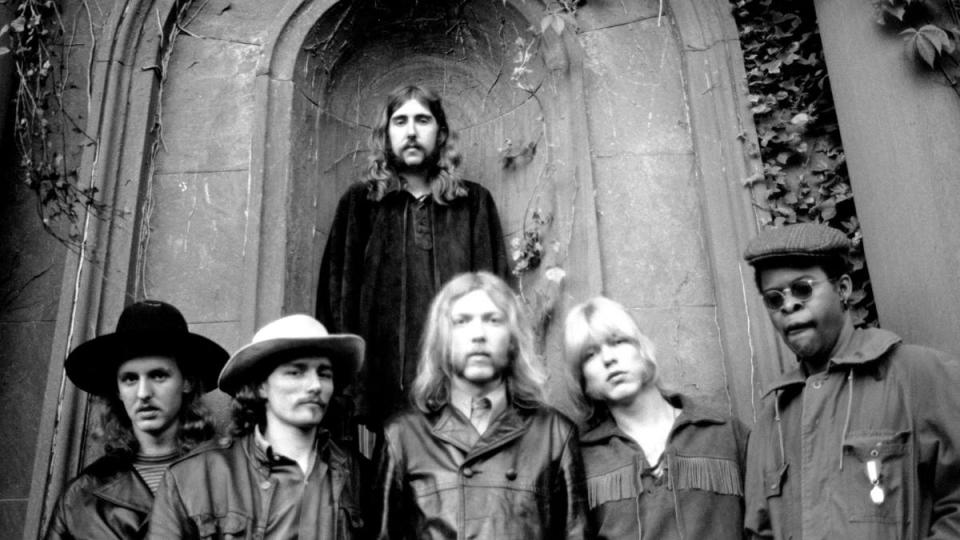
Michael Ochs Archives / Stringer / Getty
Eric Clapton caught a performance and was so blown away that he invited Duane to record with him and his band, Derek & The Dominos. “To this day, I've never heard better rock guitar playing… It’s the best,” Clapton once said of Duane’s skills, having first heard him playing on Wilson Pickett’s soulful cover of “Hey Jude.”
MUST READ: Greatest Rock Bands of All Time, Ranked: This List Will Have You Going “Crazy”
Shortly after the release of their second album, 1970’s Idlewild South, the follow-up to their 1969 self-titled debut LP, the Allman Brothers Band members would be torn apart by tragedy, losing both Duane and Oakley in motorcycle accidents just 13 months apart. New members — Chuck Leavell and Lamar Williams Jr. among them — were brought in through the years to fill in the gaps, record a few more albums and perform at shows, though the band called it quits in 1976, just a year after releasing their sixth album, Win, Lose or Draw.
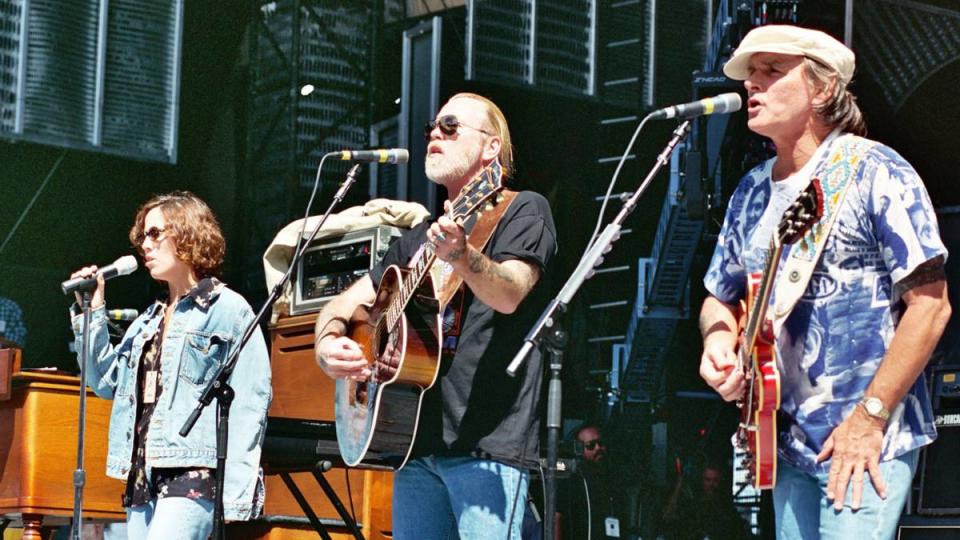
Jeff Kravitz / Contributor / Getty
After some reunions in the following decades featuring updated lineups, the original group of Allman Brothers Band members received the honor of being inducted into the Rock & Roll Hall of Fame in 1995.
“Like many of us in those days who came from the south, we grew up in an environment of music that included a bit of everything. Music was not confined to such rigid formats, and the Allman Brothers Band took what moved them and merged it into something unique that audiences loved, a sound that redefined the direction of rock and roll and opened the doors to a spirit of experimentation that continues in today’s music,” country music legend Willie Nelson said during his induction speech.
MUST READ: Willie Nelson Songs: 15 of the Outlaw Country Icon’s Hits, Ranked & the Stories Behind Them
“Rock and roll’s greatest jamming blues band,” Nelson continued, “could be imitated, but never duplicated,” yet their music still sounds as fresh and innovative today as it did when they created it.
Here’s a look at the Allman Brothers Band members and their paths before and after making musical history.
Duane Allman: Allman Brothers band members

Michael Ochs Archives / Stringer / Getty // Michael Ochs Archives / Stringer
The insanely talented guitarist — nicknamed Skydog — and his brother lost their father, an Army sergeant, while they were young, after a hitchhiker murdered him while he was home on leave. Their mother later moved the brothers to Florida in the late 50s, when the boys immersed themselves in music scene, enamored with the Southern blues, R&B and rock all around them. Duane and Gregg played in bands called the Five Minutes and the Allman Joys, then headed out to LA, where they started another group called Hour Glass.
Duane’s guitar skills soon caught the ear of many in the industry back east, and it wasn’t long before he was asked to play on recordings for the likes of Wilson Pickett, Aretha Franklin and King Curtis. Then when Eric Clapton came calling, Duane came up with the now unmistakable riff that opens the classic “Layla.”
Soon, Duane and drummer Jaimoe Johanson, a musician he met at that time, started a band in Jacksonville with bassist Berry Oakley. Once drummer Butch Trucks joined them, they knew they were on to something big, so Duane called his brother Gregg back from LA to officially form the Allman Brothers Band. A self-titled debut album was then released 1969. “I think the best music comes from the heart and soul, not from the brain,” Duane once said of their eclectic sound, adding in an an interview that ran in Guitar Magazine that he viewed rock music as “a newspaper for people that can’t read. Rock and roll will tell you right where everything’s at.”
The musician’s life was tragically cut short after he died in a motorcycle accident on Oct. 29, 1971, in the middle of the band’s Eat a Peach album sessions, requiring other musicians to be called in to finish it. He left behind his partner, Donna Roosman, and daughter Galadrielle, who was 2 at the time. “I think the music has always been my primary source for knowing about him,” Galadrielle told NPR, noting that her dad’s guitar playing “conveys emotion particularly well. ... It just kind of gets inside of you.”
Her book Please Be With Me: A Song for My Father, Duane Allman, which was so enlightening that it “came as a revelation to me,” according to brother Gregg, is her way of making peace with the loss of the legendary musician. “He died just shy of his 25th birthday and he accomplished so much,” she notes of the father she sadly never got to grow up with.
Gregg Allman

amy kossover / Contributor / Getty // Rick Diamond / Staff / Getty
Along with his brother Duane, Gregg played in various bands, such as the Allman Joys, in his teenage years in Florida, but instead of playing surf music that was popular the time, they preferred to experiment with Chuck Berry tunes and R&B music, along with country and rock. After he and Duane cut a couple records in LA as Hour Glass, Gregg remained in LA to work on some solo material until Duane called him back to Florida to get the Allman Brothers Band up and running.
The band’s talented organist and vocalist brought such iconic songs as “Dreams” and “Whipping Post” — the latter a gem on the band’s live 1971 At Fillmore East album — to the group. During his time with the band and after their split, he also recorded on his own, and his 2011 album Low Country Blues earned a Grammy nomination. He even recorded with the most famous of his seven wives — Cher — releasing Two the Hard Way in 1977. While their musical partnership didn’t soar, the two shared son Elijah Blue.
In 1989, Gregg, Dickey Betts, Jaimoe Johanson and Butch Trucks (along with Warren Haynes, Johnny Neel and Allen Woody) hit the road for a reunion tour. “It’s an exceptional feeling to see all those young folks at the shows,” Gregg wrote in his autobiography, 2012’s My Cross to Bear, about the popularity the Allman Brothers Band members experienced through the years. “When I was a kid, I didn’t listen to Tommy Dorsey. There was a generational line drawn when it came to music. Kids today love Jimi Hendrix and the Grateful Dead — all kinds of good music. They love the Allman Brothers. There’s that old saying, ‘Fun for ages 6 to 60,’ and by God, that’s what our audience is.”
Years of drug and alcohol abuse led to stints in rehab and a host of health issues for Gregg later in life, even after he cleaned up in the 90s, and a liver transplant in 2010 followed his hepatitis C diagnosis. He later died at the age of 69 in 2017 from complications from liver cancer, leaving behind his wife Shannon, three sons, two daughters, and three grandchildren.
Dickey Betts: Allman Brothers band members
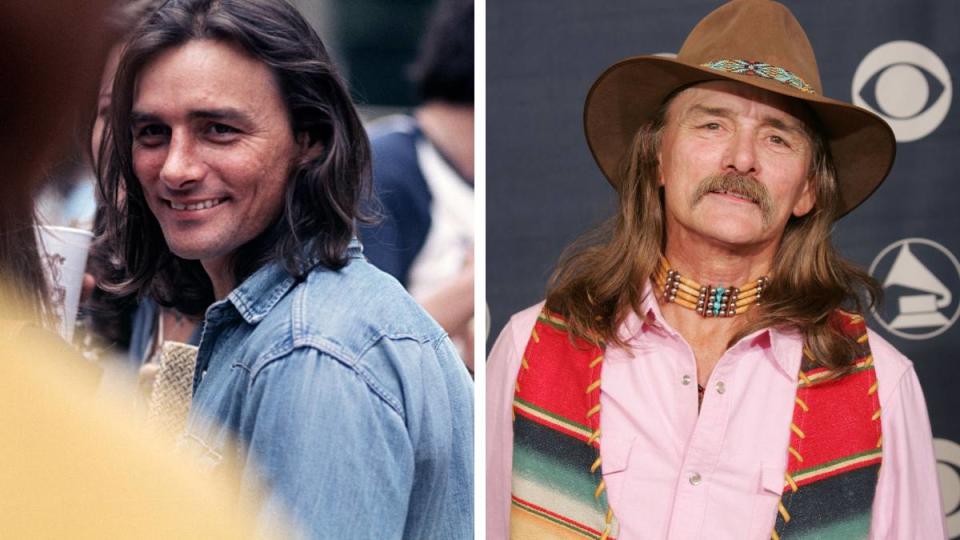
Tom Hill / Contributor / Getty // Carlo Allegri / Staff / Getty
This skilled guitarist became one of the founding Allmans Brothers Band members after playing in other groups, such as Second Coming (along with Berry Oakley). He was responsible for writing “Revival” and “In Memory of Elizabeth Reed” for the group’s second studio album, 1970’s Idlewild South.
He also wrote and sang the group’s biggest hit, “Ramblin Man,” off the 1973 album Brothers and Sisters, which came after the tragic deaths of both Duane and Berry Oakley. The group, filled out with some new members, eventually disbanded shortly after their 1975’s album Win, Lose or Draw. “We were frustrated. The music had grown stale,” Betts once said of that time. “We were confused. Drugs were a problem and some of us had to overcome that. It wasn’t just Gregg, but his problem was more obvious and newsworthy.”
He formed his own group called Dickey Betts and Great Southern, though he returned to several regroupings of the Allman Brothers Band through the years, including for several reunion tours. “People who see us live know there’s still some of the old fire left in this band — that us old guys can still have fun playing,” he said in 1989.
Betts, who was ranked 58th on Rolling Stone’s list of the 100 Greatest Guitarists of All Time, had a legal falling out with the surviving members of the Allman Brothers Band in the 2000s, straining relations, but it’s reported he and Gregg made peace before the latter’s death in 2017. Betts meanwhile continued to release several CDs throughout the years.
Though he had retired at one point, Betts decided to start touring again in 2017. “When I turned 70 years old, I just figured I wanted to go fishing and play golf and mess around and stuff,” he told Billboard, but then promotors started calling, “offering me good money to go out and play again. I was bored, and they wanted me back. That’s the way it happened.”
The musician, now 80, however, suffered a mild stroke in 2018, and has battled other medical issues in recent years.
Berry Oakley
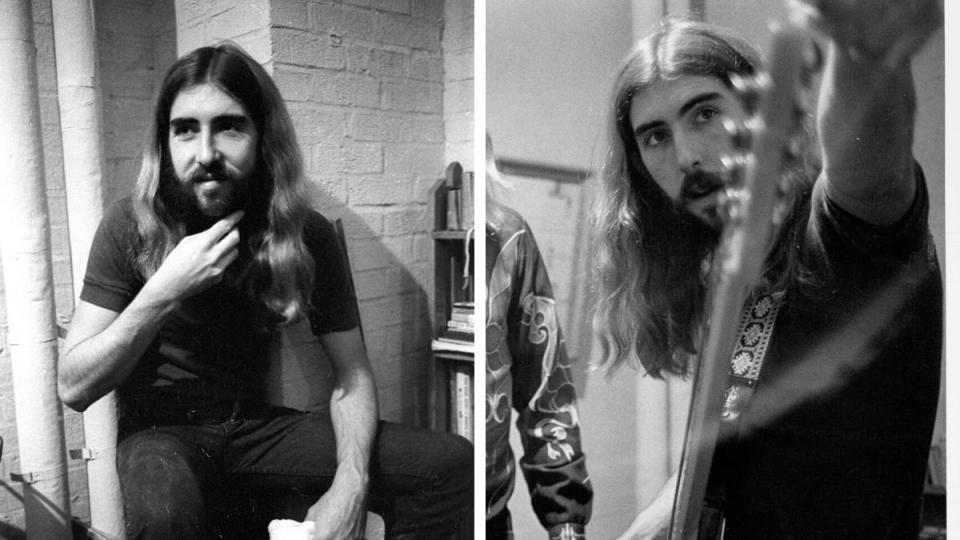
Michael Ochs Archives / Stringer / Getty // Michael Ochs Archives / Stringer
Berry Oakley had a long musical connection with Dickie Betts, as the two had been in a bunch of groups together, including Soul Children and Second Coming, before they both helped found the Allman Brothers Band. Oakley, the group’s bassist, is credited with helping create the opening riff to “Whipping Post” and revered for his expert input and playing on tracks like “Mountain Jam.” When bandmate Duane Allman died after a 1971 motorcycle crash, however, Oakley seemed to spin out of control.
“I don't think Berry really knew how to exist in a world without Duane,” Butch Trucks has written. “The sparkle that was Berry was simply gone. He drank himself into a stupor almost daily. We continued to tour but Berry’s heart just didn't seem be 100% into it any more.” Sadly, in little over a year, Oakley had what proved to be a fatal motorcycle accident of his own, not far from the site of Duane’s. “He said he wasn’t hurt and refused to get into an ambulance,” the police told the New York Times, but Oakley passed away on Nov. 11, 1972, shortly after being taken to a hospital.
He was laid to rest alongside Duane at Macon, Georgia’s Rose Hill Cemetery, and Gregg Allman joined the duo there as well after his death in 2017.
Jaimoe Johanson: Allman Brothers band members

amy kossover / Contributor / Getty // Ilya S. Savenok / Contributor
Drummer Magazine calls Jaimoe Johanson “Southern-rock royalty,” and for good reason. The musician was playing with Otis Redding, Sam & Dave, and Joe Tex even before becoming one of the original Allman Brothers Band members. “His versatility, jazz, blues rock, R&B, and soul mastery helped ensure ABB’s placement as one of the most influential classic-rock bands of the era,” the magazine wrote.
When the group disbanded in 1976, he headed out and formed Sea Level with other then-Allman members Chuck Leavell and Lamar Williams Jr. He also played in Les Breres with Butch Trucks. Most recently, he was heading up Jaimoe’s Jasssz Band that, according to its Facebook page, “combines elements of Jazz, Blues, Rock-n-Roll, and R&B into a unique blend that captures the spirit and stirs the soul.”
In a 2018 interview with American Blues Scene, he insisted he plans to play for as along as he can. “I’ll be banging away. I still do that. I do that right today. I play with anybody I want to. I love playing drums, man,” shared Johanson, who is now one of only two surviving members of the original Allman Brothers Band lineup.
“When you go on stage, you better be jamming and playing your ass off. We are the masters that we looked up to and when you hit the stage you cannot be out there shucking. Whatever you do, do it as a master,” he told The Capitol Theatre website last May before a performance, noting the responsibility — and honor — he feels being looked up to by the younger generations of musicians today.
Butch Trucks
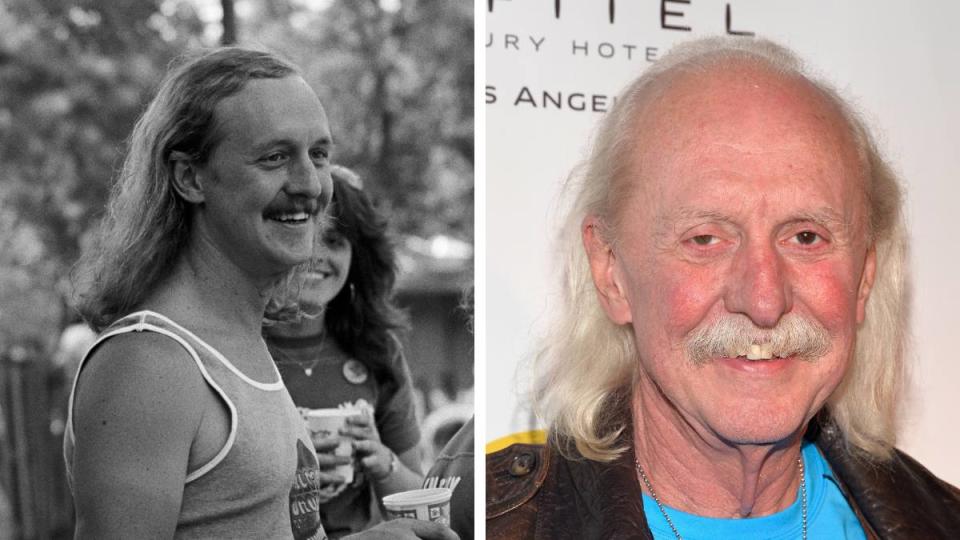
Tom Hill / Contributor / Getty // Michael Tullberg / Contributor / Getty
One of the band’s two drummers, Butch Trucks was the outfit’s strong and steady rhythmic leader. He’d been playing in a group called the Bitter Ind when he met Duane and Gregg in the mid 60s, when they were performing together as the Allman Joys.
The success he had with them and the other original Allman Brothers Band members was just the icing on a cake of musical exploration, he once explained to Rolling Stone. “We were out spreading the gospel of this music we had discovered,” he said. “We never thought that we would be more than an opening act.”
in 2016, that magazine named Butch the 71st greatest drummer of all time, and music clearly ran in the family. During the years of changing Allman Brothers Band lineups, his nephew Derek Trucks came onboard. Derek has also headed up the Tedeschi Trucks Band with Susan Tedeschi.
Sadly, Butch died by suicide on Jan. 24, 2017, at the age of 69, reportedly due to financial issues. He left behind his wife and four children. “I’ve lost another brother, and it hurts beyond words,” Gregg Allman said at the time in a statement. “Butch and I knew each other since we were teenagers, and we were bandmates for over 45 years.”
